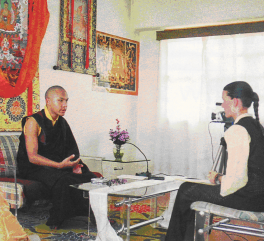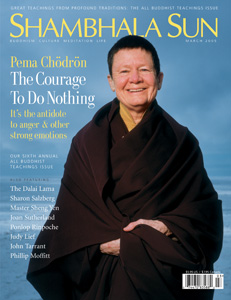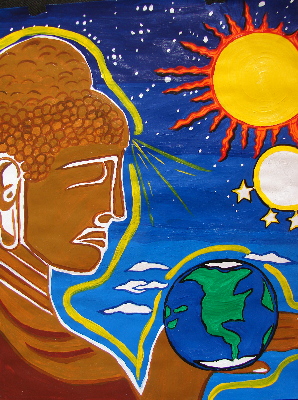Activities
Projects

Shambhala Sun 2005
Hoping for Peace, Searching for Wisdom
CHARLEE PARKINSON talks with young people about their hopes for the future, and learns how their search for wisdom has lead them to an important Tibetan teacher of their own generation.
Charlee Parkinson interviewing the 17th Karmapa for her documentary Buddha Future.
IN THE WINTER of 2003 I jour neyed to Dharamsala, at the base of India 's great Himalayan range, to produce a documentary film on peace and universal responsibility. I would interview Buddhist masters and youth of diverse religions and backgrounds about peace and their hopes for the future.
Seven days after arriving, I was at the side of His Holiness the Dalai Lama as he announced to thou- sands of people that the war in Iraq had begun. As I filmed him, this emanation of the Buddha of Compassion appeared troubled, and with many others in the assem bly, I shared his deep concern. During the day we attended the Dalai Lama's annual dharma teach ings. At night we congregated for chai and discussed the war and its potential consequences.
I stayed with a variety of young people through war protests and candlelit marches, and I shared their anger, tears and prayers for world peace. The words of a young Tibetan boy will forever remain in my mind. Thinking of the future when he is grown up, and in something of a panic, he cried out to me, "What will we do without His Holiness the Dalai Lama?" With great regret I stood speechless, unable to answer his plea. It is a question that still haunts me.
I began a series of interviews with young people to discuss our future as they gathered for guidance from the Dalai Lama. I discovered that this generation is attracted to the principles of peace and compassion, and is seeking the wisdom of how to apply these teachings in our modern world. Nearly every youth I met holds the aspiration to create a peaceful human society. Seemingly, the seed of war has inspired peace in the hearts of many.
In an interview with twenty-nine-year-old Angela from South Africa I asked, "What do you think the role of the younger generation is in creating possibilities for peace in the future?" She replied with a confident smile, "I think we all need to quickly mature on some level. We need to recognize what's going on globally, and not be so isolated in our ideas. We need to believe in ourselves because I think our generation is vital. We are upbeat, because we see our potential." When I asked her what inspired her, she replied, "For one, being in the presence of the Dalai Lama and the Karmapa greatly inspires me to practice what they have taught."
Ogyen Trinley Dorje, His Holiness the 17th Karmapa, is the nineteen-year-old supreme head of the Kagyu school of Tibetan Buddhism . In 2000, his dramatic escape from Chinese- occupied Tibet brought international attention to this young teacher, whose name means, "The one who carries out Buddha activity." The Karmapa's temporary residence is only a few miles from Dharamsala and he was referred to with great respect and admiration in the circles of young people I inter viewed. As he is of this current generation and could relate to these topics at hand, I asked to interview him for the film.
The private audience room at Gyuto Ramoche Tantric University is on the top floor of the quiet, golden monastery that overlooks lush fields of rice. Inthe background, like a perfect painting, are the majestic, snow-capped Himalayas. The long wall of windows in the private audience room lends crisp day light to the ancient thangkas that adorn the room. The Karmapa sat under an exquisite thangka of Shakyamuni Buddha.
Under the Buddha's compassionate gaze—and the watchful eyes of a number of Indian security men—we talked about humanity, the environment, dharma and enlightenment. When I relayed the concerns of the young people I had spoken with concerning our future, His Holiness responded with incredible assurance, saying, "The fact that people can create negative activities or disturbing situations means that people can create the opposite. The possibility of flexibility is always there. It is possible that what is created can be broken down and new realities and new pos sibilities can be created. So, personally I feel that it should not beat all intimidat ing or cause for fear." He went on to say, "Each individual has to realize that they have a responsi bility to be forthright, to be honest, and to maintain integrity in this way. If this is the kind of responsibility that each and every individual can do by himself or herself, then obviously the few people who indulge in greed and corruption would have very little power left."
The Karmapa's confidence and kindness, his focused interest and understanding of the issues youth face, inspired great hope in me. The insight he displays is a wonderful example of how to maintain our practice and dedication in circumstances that we find very challeng ing, both as individuals and as members of the world community.
In a subsequent interview for my film I asked Dzongsar Khyentse Rinpoche, "What do you see as the upcoming generation's greatest quality, and what do you see as their greatest challenge?" He replied after a long moment of silence, "It's very ironic. The upcoming generation's greatest quality is skepticism, but that itself is the challenge, because it will also create a lot of mistrust. Somehow, people have to find a way to be very skep tical, but in a compassionate and objec tive way, and learn to trust cause, condition and effect."
Trust is a challenge for today's youth, as they watch a future filled with many difficulties unfold. As a generation of young people struggles with uncertainty and cautiously looks for direction, many turn to the principle of compassion and the path less-traveled for hope. As His Holiness Karmapa said in our interview,
"People must recognize that among all beings, human beings have something incredibly unique about us. We have this capacity and the ability to discern so that we can actually pursue happiness and experience happiness. That is the ability and potential that we have. If instead of using that unique ability that is such a special characteristic of human beings, we misuse it and create more suffering and more disturbance, then we will be responsible for that."
I was greatly affected by this journey, and the examples of endurance and devotion that I saw in so many others along the way. I learned about our deli cate interdependence, and our capacity as a human society to prevail in uncer tain circumstances. I saw in all of the people I interviewed that, regardless of the name of the God, or the boundaries that separate us, our inherent nature seeks peace. It is the very challenge of our current circumstances to discover this inherent peaceful nature.
Some say that despite their skepticism young people are idealistic and their views impractical in our modern world. But is idealism a quality we can afford to lose right now? Is hope more impractical than fear? Sajid, a twenty-two-year-old Muslim from Bodhgaya, perhaps expressed it best when I asked him, "What potential do you see in our generation?" He replied, "Every youth should know we have to help the world now. We should not just work for ourselves, because we have such a big responsibility to our world. Our elders can only advise us, and now the younger genera tion depends on us. People who help and support each other are the ones on the right path of humanity. If we are aware of these responsibilities, then, God will ing, we can move the world towards peace." *
(c)2005 Charlee Parkinson/Thunderbolt Productions
SHAMBHALA SUN MARCH 2005
Hoping for Peace, Searching for Wisdom
CHARLEE PARKINSON talks with young people about their hopes for the future, and learns how their search for wisdom has lead them to an important Tibetan teacher of their own generation.
Charlee Parkinson interviewing the 17th Karmapa for her documentary Buddha Future.
IN THE WINTER of 2003 I jour neyed to Dharamsala, at the base of India 's great Himalayan range, to produce a documentary film on peace and universal responsibility. I would interview Buddhist masters and youth of diverse religions and backgrounds about peace and their hopes for the future.
Seven days after arriving, I was at the side of His Holiness the Dalai Lama as he announced to thou- sands of people that the war in Iraq had begun. As I filmed him, this emanation of the Buddha of Compassion appeared troubled, and with many others in the assem bly, I shared his deep concern. During the day we attended the Dalai Lama's annual dharma teach ings. At night we congregated for chai and discussed the war and its potential consequences.
I stayed with a variety of young people through war protests and candlelit marches, and I shared their anger, tears and prayers for world peace. The words of a young Tibetan boy will forever remain in my mind. Thinking of the future when he is grown up, and in something of a panic, he cried out to me, "What will we do without His Holiness the Dalai Lama?" With great regret I stood speechless, unable to answer his plea. It is a question that still haunts me.
I began a series of interviews with young people to discuss our future as they gathered for guidance from the Dalai Lama. I discovered that this generation is attracted to the principles of peace and compassion, and is seeking the wisdom of how to apply these teachings in our modern world. Nearly every youth I met holds the aspiration to create a peaceful human society. Seemingly, the seed of war has inspired peace in the hearts of many.
In an interview with twenty-nine-year-old Angela from South Africa I asked, "What do you think the role of the younger generation is in creating possibilities for peace in the future?" She replied with a confident smile, "I think we all need to quickly mature on some level. We need to recognize what's going on globally, and not be so isolated in our ideas. We need to believe in ourselves because I think our generation is vital. We are upbeat, because we see our potential." When I asked her what inspired her, she replied, "For one, being in the presence of the Dalai Lama and the Karmapa greatly inspires me to practice what they have taught."
Ogyen Trinley Dorje, His Holiness the 17th Karmapa, is the nineteen-year-old supreme head of the Kagyu school of Tibetan Buddhism . In 2000, his dramatic escape from Chinese- occupied Tibet brought international attention to this young teacher, whose name means, "The one who carries out Buddha activity." The Karmapa's temporary residence is only a few miles from Dharamsala and he was referred to with great respect and admiration in the circles of young people I inter viewed. As he is of this current generation and could relate to these topics at hand, I asked to interview him for the film.
The private audience room at Gyuto Ramoche Tantric University is on the top floor of the quiet, golden monastery that overlooks lush fields of rice. Inthe background, like a perfect painting, are the majestic, snow-capped Himalayas. The long wall of windows in the private audience room lends crisp day light to the ancient thangkas that adorn the room. The Karmapa sat under an exquisite thangka of Shakyamuni Buddha.
Under the Buddha's compassionate gaze—and the watchful eyes of a number of Indian security men—we talked about humanity, the environment, dharma and enlightenment. When I relayed the concerns of the young people I had spoken with concerning our future, His Holiness responded with incredible assurance, saying, "The fact that people can create negative activities or disturbing situations means that people can create the opposite. The possibility of flexibility is always there. It is possible that what is created can be broken down and new realities and new pos sibilities can be created. So, personally I feel that it should not beat all intimidat ing or cause for fear." He went on to say, "Each individual has to realize that they have a responsi bility to be forthright, to be honest, and to maintain integrity in this way. If this is the kind of responsibility that each and every individual can do by himself or herself, then obviously the few people who indulge in greed and corruption would have very little power left."
The Karmapa's confidence and kindness, his focused interest and understanding of the issues youth face, inspired great hope in me. The insight he displays is a wonderful example of how to maintain our practice and dedication in circumstances that we find very challeng ing, both as individuals and as members of the world community.
In a subsequent interview for my film I asked Dzongsar Khyentse Rinpoche, "What do you see as the upcoming generation's greatest quality, and what do you see as their greatest challenge?" He replied after a long moment of silence, "It's very ironic. The upcoming generation's greatest quality is skepticism, but that itself is the challenge, because it will also create a lot of mistrust. Somehow, people have to find a way to be very skep tical, but in a compassionate and objec tive way, and learn to trust cause, condition and effect."
Trust is a challenge for today's youth, as they watch a future filled with many difficulties unfold. As a generation of young people struggles with uncertainty and cautiously looks for direction, many turn to the principle of compassion and the path less-traveled for hope. As His Holiness Karmapa said in our interview,
"People must recognize that among all beings, human beings have something incredibly unique about us. We have this capacity and the ability to discern so that we can actually pursue happiness and experience happiness. That is the ability and potential that we have. If instead of using that unique ability that is such a special characteristic of human beings, we misuse it and create more suffering and more disturbance, then we will be responsible for that."
I was greatly affected by this journey, and the examples of endurance and devotion that I saw in so many others along the way. I learned about our deli cate interdependence, and our capacity as a human society to prevail in uncer tain circumstances. I saw in all of the people I interviewed that, regardless of the name of the God, or the boundaries that separate us, our inherent nature seeks peace. It is the very challenge of our current circumstances to discover this inherent peaceful nature.
Some say that despite their skepticism young people are idealistic and their views impractical in our modern world. But is idealism a quality we can afford to lose right now? Is hope more impractical than fear? Sajid, a twenty-two-year-old Muslim from Bodhgaya, perhaps expressed it best when I asked him, "What potential do you see in our generation?" He replied, "Every youth should know we have to help the world now. We should not just work for ourselves, because we have such a big responsibility to our world. Our elders can only advise us, and now the younger genera tion depends on us. People who help and support each other are the ones on the right path of humanity. If we are aware of these responsibilities, then, God will ing, we can move the world towards peace." *
(c)2005 Charlee Parkinson/Thunderbolt Productions
SHAMBHALA SUN MARCH 2005
Published Articles




